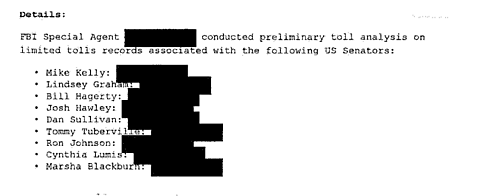
Matthew Cavedon
On Monday, Senator Chuck Grassley (R‑IA) revealed that the FBI spied on nine Republican senators during the Biden administration. Politico responded by dismissively huffing that the agency did not technically tap the Senators’ phones—it merely tracked the time and length of the calls they made. It should have added that the FBI also logged who was involved in the Senators’ calls.
First, the bad news for the senators and the rest of us: the Supreme Court has held that agents recording every number called from a telephone is not a search under the Fourth Amendment. The Court’s reasoning? “[W]e doubt that people in general entertain any actual expectation of privacy in the numbers they dial,” because everyone knows the phone company will monitor who they call, and the Fourth Amendment does not protect information an American “voluntarily turns over to third parties.”
As a matter of law-chamber sociology, that’s ridiculous. Yes, everyone knows that AT&T or T‑Mobile computers keep your call logs somewhere. But no one thinks that by using phones, they invite the government to snoop on how often they’re calling the oncologist, the accountant, the minister, a political rival, or a mistress. Even just pulling basic call information—like the FBI did to the senators—uncovers “a wealth of detail” about people’s “familial, political, professional, religious, and sexual associations.”
The Supreme Court’s logic is also bonkers as a matter of the law of privacy more generally. It’s usually obvious that privacy can be “waived for one purpose,” like phone billing, “and still asserted for another.” For these reasons, Brent Skorup and Laura Bondank recently joined a long line of Cato scholars criticizing this “third-party consent” exception to the Fourth Amendment. Hopefully, the Supreme Court will come to agree with Cato that a search is simply an action undertaken with the “purpose of finding something”—such as tracking who calls whom and for how long.
But in the meantime, here’s the good news: the very senators who were spied on can ensure that this intrusion does not happen to them or their fellow Americans again. Even if the Supreme Court reads the Fourth Amendment too narrowly, Congress can pass a statute requiring the FBI to get a warrant before monitoring call information. That’s exactly what Congress has already done for wiretaps.
Senator Grassley has said that there will be consequences following his revelation: “If heads don’t roll in this town, nothing changes.” He should make good on his word by instituting new statutory limits on call-information monitoring.







